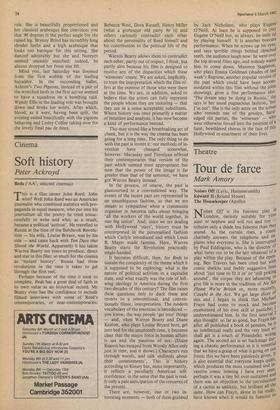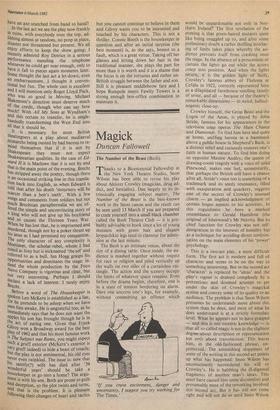Theatre
Tour de farce
Mark Amory
Noises Off (Lyric, Hammersmith) Edward H (Round House) The Housekeeper (Apollo)
Noises Off is the funniest play in London, entirely suitable for your aunt or nephew and will run and run '— tributes only a shade less fulsome than they sound. As the curtain rises, a coolie charlady answers the telephone and ex- plains who everyone is. She is interrupted by Paul Eddington, who is the director of what turns out to be the last rehearsal of a play within the play. Because of the Men' ing, Ben Travers has been cited but with comic sheikhs and feebly suggestive lines about 'just time to fit it in' or 'still poking around', the corpse they are labouring to give life is more in the tradition of No Sex. Please We're British or, more recently, Caught in the Act. We get large slices of this and I began to think that Michael Frayn had come to mock and become enamoured of his own skill at pastiche; I underestimated him. In the first interval I also thought: so far so good, but Frayn has after all published a book of pensees, he is an intellectual really and the very least we shall get is a touch of Pirandello; wrong again. The second act is set backstage dor", ing a chaotic performance so it is essential that we have a grasp of what is going on °I.1t „ front; this we have been painlessly given. 11- is also essential that everyone keeps quiet' which produces the most sustained and in' ventive comic miming I have ever seen' perhaps it was a tiny bit over-sustained and there was an objection to the introduction of a cactus as unlikely, but brilliant all the same. How can Frayn, alone in his study" have known when it would be funniest to
have an axe snatched from hand to hand?
In the last act we see the play now frankly in ruins, with everybody over the top, ad- libbing almost at random, no prop in place, disaster not threatened but present. We all enjoy efforts to keep the show going; I recently admired Roy Dotrice in a serious Performance mending the telephone whenever he could get near enough, only to have it fall to pieces again moments later. Some thought the last act a let-down, even an embarrassment. I thought it conven- tional but fun. The whole cast is excellent and I will mention only Roger Lloyd Pack, who was so good in Moving. Michael Blakemore's direction must deserve much of the credit, though who can say how much? With All My Sons at Wyndham's and this certain to transfer, he is single- handedly transforming the West End into all that it should be. It is necessary for most British theatregoers at a play about mediaeval monarchs being ousted by bad barons to re- mind themselves that if it is not by Shakespeare they must not expect Shakespearian qualities. In the case of Ed- ward II it is Marlowe that it is not by and that is the main point of the evening. Brecht has stripped away the poetry, though there is an occasional striking line in this transla- tion back into English, as when Edward is told that after his death 'mourners will be scarcer than a hen's teeth'. With a few songs and comments from soldiers but not much Brechtian paraphernalia we are of- fered the simple and unconvincing story of a king who will not give up his boyfriend and so causes the Thirteen Years War. When he has lost that, he is imprisoned and taurdered, though not by a poker thrust up his anus as I had promised my companion. The only character of any complexity is Mortimer, the scholar-rebel, whom I had noted as foxy but is nicknamed 'the eel' and referred to as a bull. Ian Hogg grasps his opportunities and dominates the stage; in- deed the whole production by the Foco Novo Company is vigorous and clear, but not very interesting. Perhaps I should declare a lack of interest: I rarely enjoy Brecht.
Before a word of The Housekeeper is spoken Leo McKern is established as a liar, for he pretends to be asleep when we have seen him awake. He is ungrateful too, as he immediately says that he does not want the apples his son has brought though he is in the act of eating one. Given that Frank Gilroy won a Broadway award for the best play of 1962 and that his most famous work is The Subject was Roses, you might expect such a gruff exterior (McKern's exterior is very gruff indeed) to hide a heart of treacle; but the play is not sentimental, his old eyes never even twinkled. The issue is: now that his saintly(?) wife has died after '39 wonderful years' should he take a housekeeper or go into a home? The argu- ment is with his son. Both are prone to guilt and deception, so the plot twists and turns, and that is the problem. It is pleasant following their changes of heart and tactics
but you cannot continue to believe in them and Gilroy wants you to be interested and touched by his characters. This is not a thriller. Connie Booth is the housekeeper in question and after an initial surprise (the best moment) is, as she says, honest to a fault, which is a great virtue. Taking off her glasses and letting down her hair in the traditional manner, she plays the part for more than it is worth and it is a shame that the focus is on the tortuous and rather un- British struggle between the father and son. Still it is pleasant middlebrow fare and I hope Rumpole meets Fawlty Towers is a strong enough box-office combination to maintain it.







































 Previous page
Previous page